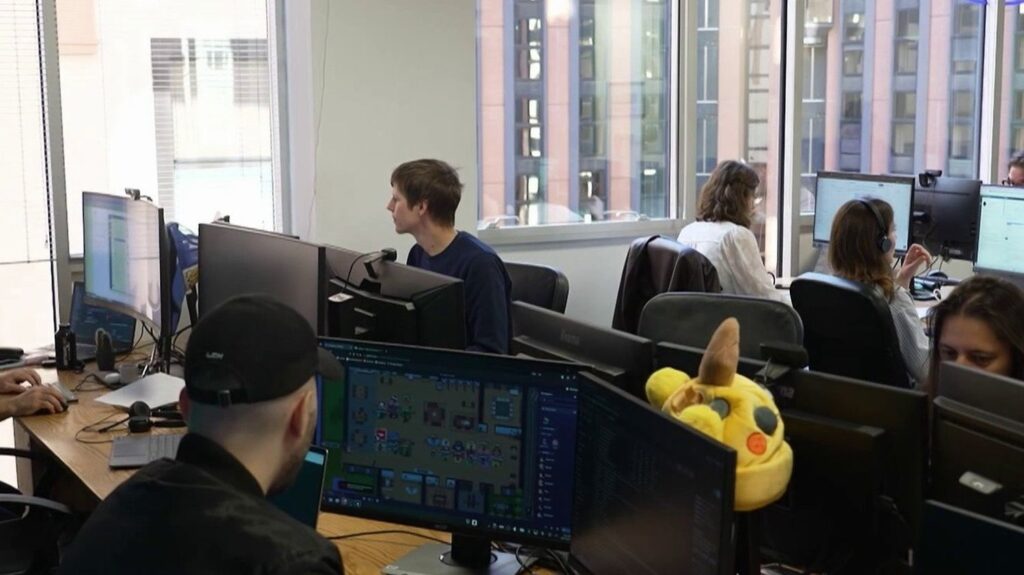Published
Updated
Reading time: 4min – video: 4min
4 minutes
In France, salaries are a crucial but still taboo subject in business. Asking how much your colleague earns is a question that can be misunderstood. However, a European directive will impose more transparency by next June. Companies are already applying this operation.
This text corresponds to part of the transcription of the report above. Click on the video to watch it in full.
In this startup, everyone knows who earns how much. There is Julie, communications manager, 38,500 euros gross per year. And just behind, Benoît, software developer, 84,000 euros. Here, no taboos, all salaries are online. “We have an internal database where remuneration is updated each time it changes. And there you have it, in two clicks, I have access to the remuneration of the entire company. The fact that it is displayed is something that creates a dynamic where everything is open, everything is accessible and nothing is hidden from us”explains Marion Serano, customer relations manager at Smappen.
This Toulouse-based company has implemented salary transparency since its creation, in 2018. And this convinced Guillaume Fixari to apply last August. “I had a PDF attached by email with, line by line, the name, position, remuneration of the employees and their year of experience”indicates the now customer relations manager.
Paid 70,000 euros per year, Laurent Leclerc is the co-founder of this market research company. Even the increases are done without secrecy. Each must be approved by three people and, he says, everyone wins. “It really allows all employees to have a very collective spirit. In fact, it erases tensions. There are no more tensions, there are no more subjects, there are no more debates”underlines the co-founder of Smappen.
Salary transparency arises during the lunch break, when employees of several companies get together, and for some, it is a discovery. “We didn’t talk about it at all within the company”reacts an employee from another company, who admits that money remains a subject “instead” taboo. “We have our salary, we don’t talk about it with our work colleagues”he adds. “And it’s more complicated to change things in a large group than in a small startup type company, where there are very small staff. The state of mind is different all the same”believes his neighbor at the table.
The obligation of transparency by employment category is for 2026. A European directive imposes it. Objective: fight against inequalities. In Lille (North), Clinitex, a cleaning company took the plunge 10 years ago. Among its employees, Cédric Deloddere. “I earn 1,500 euros net. So, with a little seniority, I’ve been here for 10 years. It’s true that everything is transparent, so we know why this person earns so much. I’m a warehouse manager, I have a colleague who is just a warehouse worker, we can’t have the same salary”he points.
From warehouses to office. Here, there is no problem giving your pay. This lifting of secrecy is a small revolution for Sophie Joan, a salesperson in the same company: “I come from a company where we were given our pay slip in person in an envelope that had a cross on it and if we opened it at work, we really got slapped on the wrist. So, it was really a taboo subject. We weren’t supposed to talk about salary at all among colleagues”she explains.
Today, according to a study, only 4% of companies demonstrate transparency. Because it takes time. It took Édouard Pick 5 years to put everything together. According to this boss, this requires a careful inventory of jobs and establishment of pay scales. “Introducing transparency will allow us to either explain or correct. So, we still need a form of consistency, alignment, sincerity in this salary policy so that it can be shown. Otherwise, what we hide is what we don’t want to show”he points.
The directive must be transposed by June 2026. Companies have seven months left to prepare.
Companies cited in the report
Investigation report
Non-exhaustive list.

/2025/10/14/salaires-transparence-68eeba709ae87409936135.jpg)

